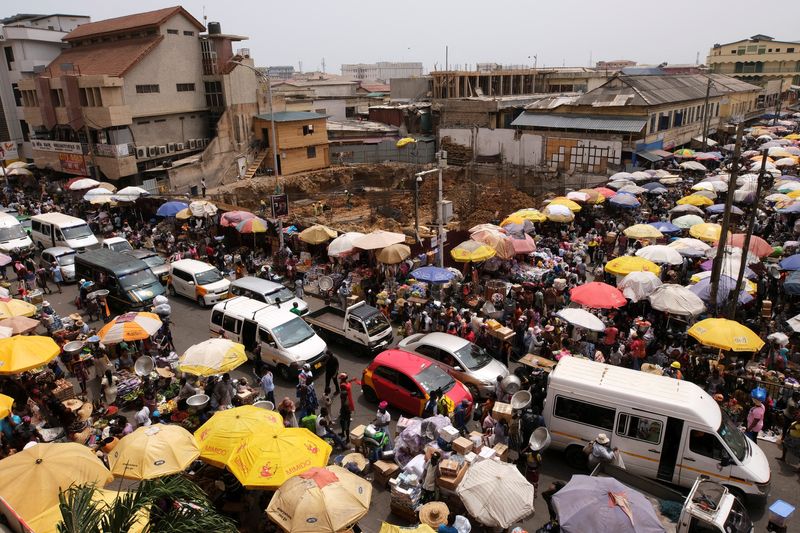By Maxwell Akalaare Adombila
ACCRA (Reuters) - Ghana is clamping down on private pension fund managers who want to invest in offshore assets on concerns it could worsen pressure on its cedi currency, three industry sources told Reuters.
After pension reforms in 2010, workers' retirement contributions in the world's number two cocoa producer enjoyed strong growth, buoyed by a tiered scheme that allow private firms to manage some contributions.
Assets under management by the pension fund industry were 78.2 billion Ghanaian cedis ($4.93 billion) in June, of which over 73% were managed by 39 private fund management firms.
Ghana's state-run pension fund handles tier one contributions towards employees' monthly retirement benefits, which are mandatory, while private firms manage tiers two and three - mandatory and voluntary contributions respectively - for lump-sum payment at or before retirement.
The majority of contributions are invested in Ghanaian assets, including Ghana government Eurobonds. However, private fund managers have been eager to explore offshore investment opportunities following the restructuring of 31 billion cedis of their holdings under a local debt rework.
Ghanaian laws permit private fund managers to invest up to 5% of total assets abroad, approximately 2.8 billion of current assets under management, though firms and authorities differ on the necessity of prior approval.
Some fund managers invested in offshore assets earlier this year, the sources, two in the private pension firms and one at the finance ministry said, but were stopped by the regulator, the national pensions regulatory authority (NPRA).
"They (NPRA) threatened to sanction us but we didn't find any basis in law," one of the source at a fund management company told Reuters.
"We have not exited but we can't invest more (offshore). It's a very strange development," said the source who asked not to be named, adding that they had $5 million in offshore assets.
John Kwaning Mbroh, head of NPRA, told Reuters that "there's no resistance" to investing pension assets offshore but the regulator needed approval from the government before signing off.
Mbroh said discussions were taking place to streamline the rules and clarify how to value offshore investments for contributors and fund managers, although he did not know when they would conclude.
'PROTECTING LIQUIDITY'
Ghana is concluding a challenging debt-restructuring process under the G20's Common Framework initiative, having defaulted on most of its $30 billion international debt in 2022.
Despite Ghana's economic recovery, the cedi currency has depreciated 25% against the U.S. dollar year-to-date, having already fallen around 17% in 2023.
The source at the finance ministry, who also requested anonymity, said the ministry was concerned about the need to "balance the effects" of investing pension funds abroad on domestic liquidity and value appreciation to fund managers.
"The ministry won't say 'no' but it's about how do we protect the economy, the liquidity," the source said.
Private pension management firms in Ghana argue that authorities are overly cautious, pointing out that local mutual funds and African pension funds invest offshore without similar concerns.
They contend the current policy, given high inflation and cedi depreciation, limits value creation and mutes gains.
They also say it is contradictory to allow foreign pension funds to invest in Ghana's market while preventing local funds from investing abroad.
"The world over, pension funds chase value but they want us to chase inflation," an executive of one of the top five fund managers said, adding that investing 5% of their assets abroad doesn't even move the needle.
($1 = 15.8800 Ghanian cedi)
